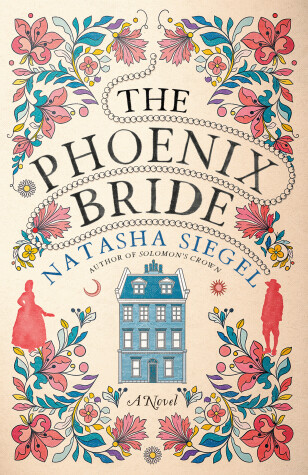I have always loved England. I will try to read anything I can about England when given the opportunity. I do read books from the Victorian or Regency era, but I will read earlier if I find a book I like. The Phoenix Bride definitely fit what I liked, and seeing that it takes place before, during, and after The Great Fire (an event that I have read almost next to nothing about), my interest was caught.
The Phoenix Bride’s storyline centers on Cecilia and David, their backstories, their romance, and The Great Fire (and its aftermath). I found this a well-written, eye-opening book about life in 1666. I did have questions about the end of the book. It was vague, and I couldn’t tell if there was an HEA. But, considering how prejudiced people were, I went for not being an HEA—just an HEA for that moment.
Cecilia was a hot mess when the book started. Her mental health issues were addressed immediately, and you couldn’t help but pity her. She went into a deep depression when her husband died. But, the book didn’t dwell on Cecilia’s mental health for long. Instead, it steamed forward with her falling in love with David and her engagement to Sir Grey. In a world where women were considered property and often were regulated to the background, Cecilia refused to do so. When she wanted something (in this case, it was David), she went after it, no matter the consequences.
I liked David, and he was another one that I felt terrible about. He dealt with antisemitism daily (which would depress me). He also lost the man he loved to the plague and couldn’t talk to anyone about it (remember, being homosexual back in the 17th century could end up with jail time). He had taken over his ailing father’s practice and was busy with patients. I was surprised he agreed to go to Cecilia’s sister’s house. I was also surprised by his reaction to Cecilia. But, mostly, I was saddened by his grief and stress.
I was very interested in the medical aspect of The Phoenix Bride. I knew the basics of how doctors dealt with the plague back then (plague doctor masks filled with scented flowers), but I never knew what a doctor did on a day-to-day basis (besides bloodletting and leeches). Reading about the different herbs and flowers used to help with different afflictions was interesting. I wish the author had spent more time on that in the book.
Also, what was interesting to me in the book was how doctors treat mental illness and neurodivergent people. Bloodletting was very popular. Cecilia was also confined to a courtyard and her room, was not allowed to exercise, and didn’t visit anyone. It was a little disturbing how she was viewed and treated. Sir Grey was treated similarly (I think he had ADHD or maybe autism, but I am not sure).
I was also interested in how the homosexual community was treated back then. It seemed to me (even though it was technically illegal..the sodomy laws were enacted in 1533) that most people were accepting of the molly houses, and the police did periodic sweeps to appease the government. It seemed like people were accepting in the book. But, even with that, David and Jan (and maybe Sir Grey) had to keep their sexuality very quiet or risk being put in jail or to death.
The Great Fire of London was also incorporated into the plotline during the last half of the book. Only a few details about how it started were given, but there was speculation. I was surprised by how the upper class reacted to the fire. They were on barges watching London burn and people trying to escape. It seemed weird, but I could see why people did it. The author also detailed the aftermath of the fire from David’s POV. He escaped with his life but lost everything.
The romance between Cecilia and David did seem a little forced in spots. I know I am cynical, but I don’t believe in falling in love in only a week (or, in this case, a couple of days). But, even with it feeling forced, I did like their chemistry and how they interacted.
The end of The Phoenix Bride was good, but it was a little vague. I liked that Cecilia and David finally got back together (after being apart for a year). But I read that last chapter, and I couldn’t figure out if they were together with Sir Grey’s blessing or going behind his back. That’s why I mentioned it might be a HEA for now instead of forever.
Many thanks to Random House Publishing Group – Ballantine, Dell, NetGalley, and Natasha Siegel for allowing me to read and review this ARC of The Phoenix Bride. All opinions stated in this review are mine.
